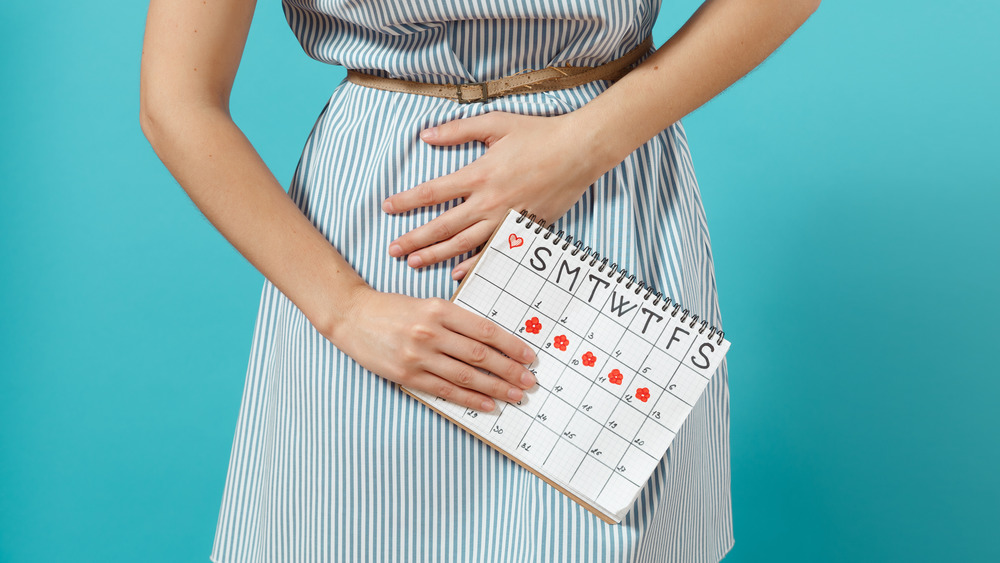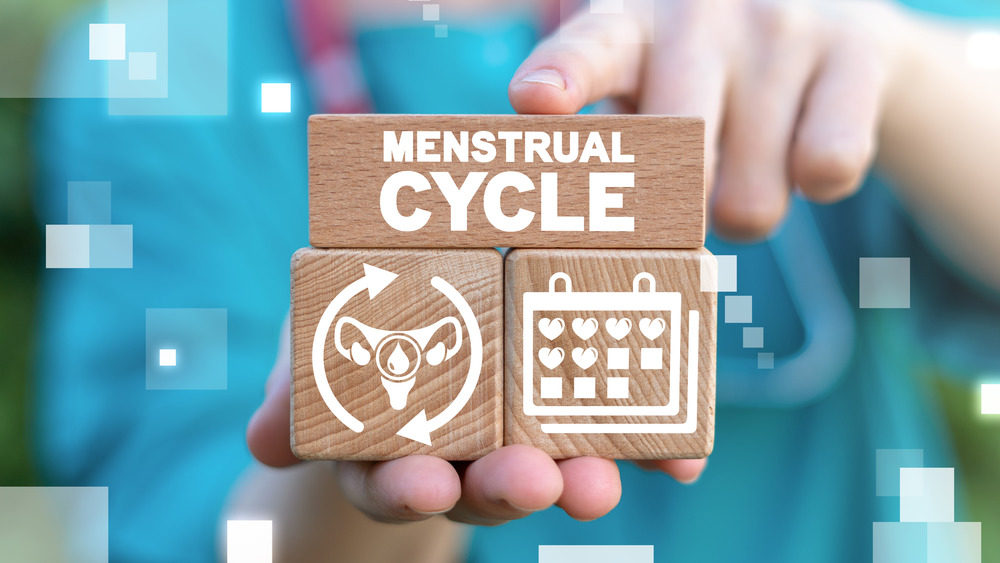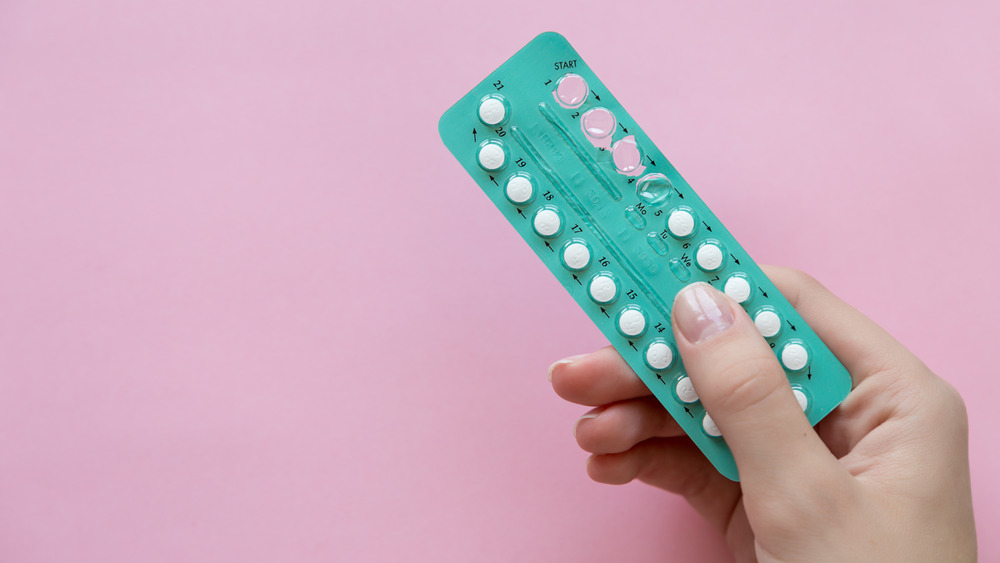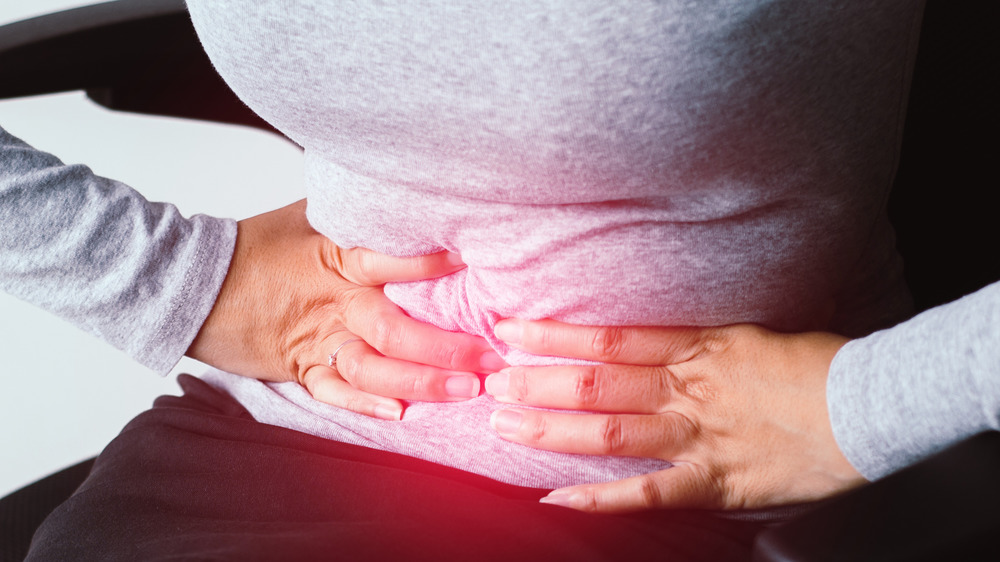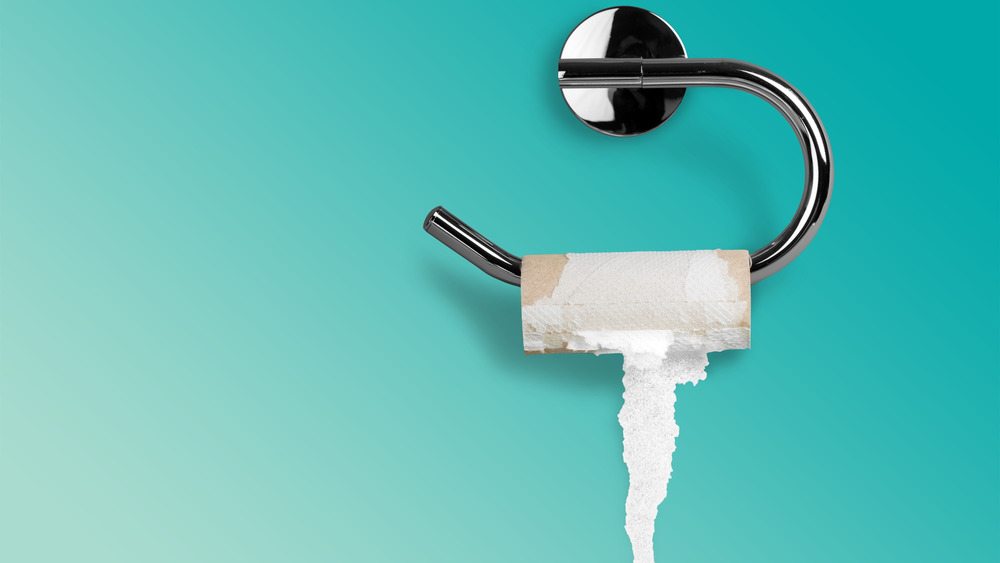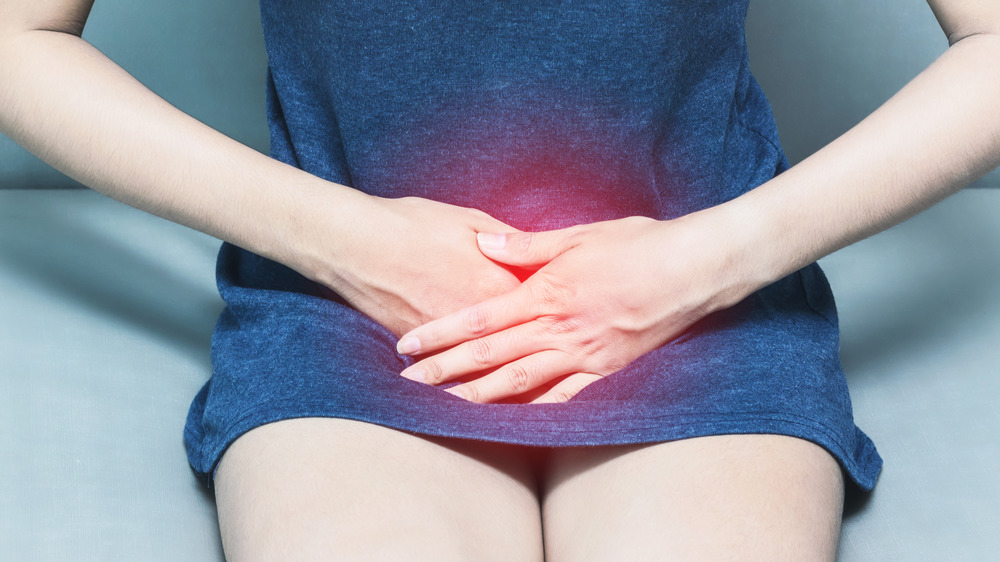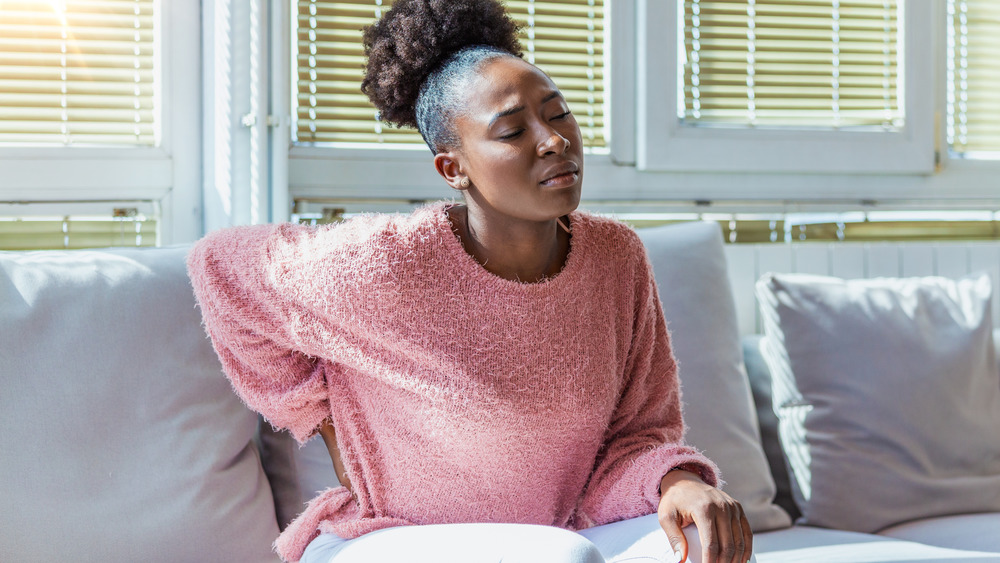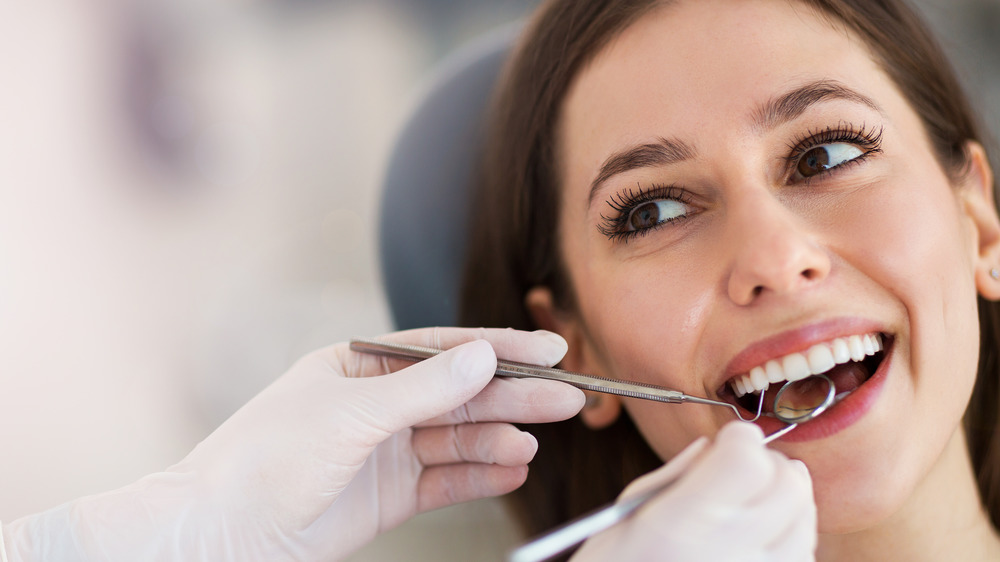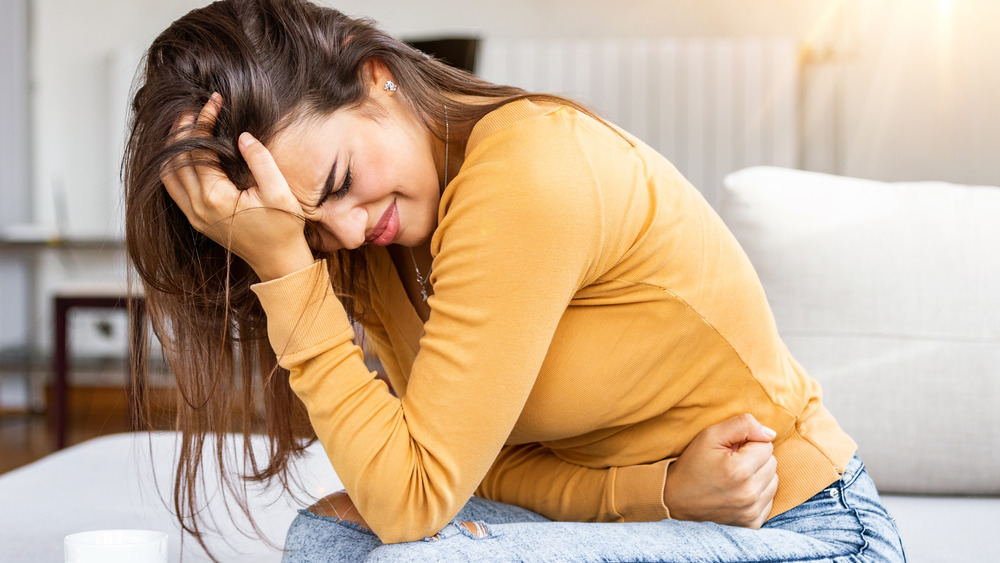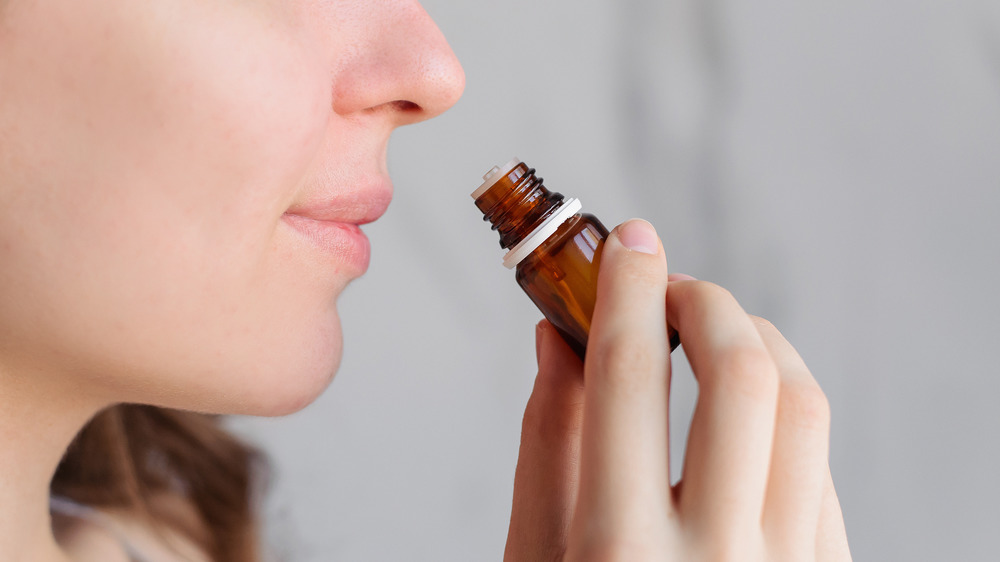When You Have Your Period, This Is What Happens To Your Body
If you've had periods for years or decades now, you've likely resigned yourself to Aunt Flo's inevitable monthly visit. Whether you refer to your monthly cycle as the Red Badge of Courage, the Crimson Tide, Shark Week, or another silly moniker, you know all too well that menstruation starts during puberty and stops at menopause. In between is a period of time that averages almost 40 years. That's a long time! You may as well get familiar with your "moon time" inside and out.
Some quick facts to remember, courtesy of Merck Manual: Menstrual cycles range from 25 to 36 days, with three to seven days of bleeding. During that time, you'll lose anywhere 0.5 to 2.5 ounces of blood. Although a 28-day cycle is considered standard, only about 10 to 15 percent of women have cycles that last exactly that length, and 20 percent of women have irregular menstrual cycles.
Want to know more about your time of the month? Here's a look at what happens to your body when you have your period.
Your period is part of the first phase of your menstrual cycle
When you get your period, you'll know you're in the first stage of your menstrual cycle. Healthline described what happens during this phase, which actually starts in the previous cycle when an egg isn't fertilized. This causes your estrogen and progesterone levels to drop. Because the uterus isn't needed to support a pregnancy, the lining sheds through your vagina. That's when you see the combination of blood, mucus, and tissue and get out the pads, tampons, period underwear, or menstrual cups to absorb.
While this is happening, your ovaries and pituitary gland are already getting ready to build that lining back up again, Dr. Mary Jane Minkin, clinical professor of obstetrics, gynecology, and reproductive sciences at Yale University School of Medicine, told Self. Your period starts the part of your cycle known as the "proliferative" or "follicular phase." This is your body's way of preparing itself for a possible pregnancy next month.
Period length and symptoms vary, but the most common symptoms include cramps, bloating, tender breasts, irritability, mood swings, headaches, fatigue, and lower back pain (via Healthline).
Hormones play an important role in your period
Throughout a menstrual cycle, three key hormones play a role: estrogen, testosterone, and progesterone. At the start of your period, estrogen is at its lowest point and begins a "steady climb," according to Hormonology. As it rises, it will elevate your mood and energy.
If you're on hormonal birth control, though, the menstrual phase will be a bit different. The estrogen will prevent your pituitary gland from releasing follicle-stimulating hormone (FSH), so the follicles don't mature, Self explained. Combined hormonal birth control also contains progestin, which makes the uterine lining thinner and less hospitable for a fertilized egg. It also thickens the cervical mucus, making it harder for the sperm to get through.
Periods are usually lighter and not as painful on birth control, and some types of contraception, like an IUD or birth control implant, can suppress bleeding altogether. Additionally, "any form of progestin-containing [birth control] that requires it get into your bloodstream to work (so, all of them except the IUDs) have a higher likelihood of suppressing ovulation," Self explained.
There are a number of conditions that can affect a normal cycle
Polycystic ovary syndrome (PCOS), a hormonal disorder, is one of numerous conditions that can affect a person's menstrual cycle. Another is endometriosis, a condition in which tissue like the kind that lines the inside of your uterus actually grows outside it (via Mayo Clinic). This results in severe pelvic pain and cramps, and sometimes heavy periods or bleeding in between periods. Uterine fibroids typically don't cause symptoms, but they can also include heavy bleeding and periods that last more than a week, according to the Mayo Clinic.
If you're not getting a period at all, it could be due to birth control, pregnancy, or an eating disorder like anorexia or bulimia, Healthline explained. You should see a healthcare provider if your period has become irregular, have stopped altogether, or if they last for more than a week at a time.
During your period, you may have a lower tolerance for pain
Have you seen the videos of men using a period pain simulator? Try as they might, they won't ever really know just what menstrual cramps feel like. Not just because of their sex, but because women are generally more sensitive to pain than men, especially during this time of the month.
A 2003 study in Perceptual and Motor Skills found that "women rated pain significantly higher in the menstrual and premenstrual phases than in the mid-menstrual and ovulatory phases. This is consistent with other studies showing less pain sensitivity during phases of the menstrual cycle associated with high estrogen." The University of Oxford released a study in 2011 essentially corroborating these results. As Science Daily reported, the findings, which were published in Pain, can be summarized thusly: "Women with painful periods show increased sensitivity to pain throughout their cycles, even when there is no background period pain."
The study involved brain imaging, which showed that there are differences in the way the brain processes pain. Period pain is associated with this, and even more so, the differences last throughout the menstrual cycle. The results suggested that there may be "longer-lasting changes to the experience of pain and discomfort." Interestingly, there were found to be similarities in women with painful periods and people who have chronic pain conditions.
You may need to go to the bathroom more during your period
As if period cramps weren't enough, some people also experience gastrointestinal upset during this time of the month. Anna Rothschild of PBS' digital series, Gross Science, explained that two chemicals, prostaglandins and progesterone, are responsible. "Prostaglandins signal the uterus to contract, to push out the uterine lining," she explained. "But it's likely that some nonconformist prostaglandins head over to the bowels and make them contract too, with some stinky results." Additionally, progesterone lowers during menstruation. In higher amounts, this hormone tends to be "constipating," so when it drops, well, you've got to go more frequently.
Women who have inflammatory bowel disease (IBD) see more of their symptoms during their periods. A 2013 Gut Liver study confirmed this. "The IBD patients experienced more frequent premenstrual GI symptoms than the controls," the study found. Bowel habits of both the IBD group and control group changed throughout the menstrual cycle, with "more severe mean abdominal pain" observed in both groups during the menstrual phase. The IBD group also experienced a "significantly higher number of stools, a higher number of loose stools, and more severe mean abdominal pain throughout the menstrual cycle," researchers wrote.
You may be more susceptible to yeast infections during your period
Yeast infections are bad enough, but to get them during a period is worse. Apparently this is common for many women. As Dr. Elizabeth Boham, family functional medicine physician, wrote for Mind Body Green, "On top of the cramping and bleeding of their monthly cycle, they also get hit with symptoms of itching and burning in the vaginal area and a white clumpy discharge."
Researchers aren't sure why yeast infections are more common during menstruation. "It may be from changes in the vaginal pH that can occur when there are shifts in hormones," the doctor wrote. "Another theory is that when estrogen levels increase in the body, yeast cells have an easier time growing and staying in the vaginal area."
There are steps you can take to avoid the yeast-period combination. Dr. Boham said to start with proper nutrition, avoiding alcohol, simple sugars, and refined carbohydrates because these foods will "feed the yeast that can result in an infection. Focus on other ways to tame the cravings by focusing on self-care." She also said not to douche, avoid unnecessary antibiotics, and consider taking a probiotic.
During your period, you might be clumsier
Pay attention to your balance over the next month. You may not have made the correlation before, but clumsiness may increase during your period. "High estrogen levels cause your liver to make hormones that affect the kidneys and lead to fluid retention in your body and brain," Dr. Mary Jane Minkin, gynecologist, told Women's Care Florida. "This makes it difficult for you to keep your balance during your period."
Interestingly, a 2002 study in the Journal of Athletic Training looked into whether anterior cruciate ligament (ACL) injuries in female athletes occurred randomly or happened during a specific phase of the menstrual cycle. Apparently, women injure their ACLs more frequently than males who participate in similar athletic activities, and they're also at risk for less successful outcomes after ACL reconstruction compared to men, which is why researchers were curious. You can probably guess where this is going. "A significantly greater number of ACL injuries occurred on days 1 and 2 of the menstrual cycle," the study concluded.
Menstrual cramps can make certain tasks more difficult
Here is another doozy you can add to the list of things your period can alter: brain function. More specifically, menstrual cramps can affect your brain.
A first of its kind study in 2014 published in Pain looked at this very issue. The study tasked 52 healthy adult women with performing four activities that measured selective attention (being able to choose between competing targets), attention span (monitoring and updating information), and dividing and switching attention between two tasks (via Medical Daily). Period pain was found to negatively affect performance, and women struggled more when they had such pain.
Lead author Dr. Ed Keogh told Medical Xpress, "Pain is an extremely common experience and can have a disruptive effect on all our daily lives. Our research looked at how common everyday pain, experienced by many women each month, affects their ability to perform a range of complex tasks. This shows that the effects of pain go beyond the sensory experience, affecting what we think and feel."
Menstrual cramps aren't just in the stomach
Just like morning sickness is a misnomer, so is the prevailing thinking about menstrual cramps being felt only in the stomach. Some women get period cramps in their legs or other parts of the body. "Sometimes women feel those cramps in different ways, including referred pain to their back, their buttocks, and their thighs," Dr. Raegan McDonald-Mosley, chief medical officer at Planned Parenthood Federation of America, told Vice. "It has to do with the release of a chemical called prostaglandins. It's a normal part of the menstrual cycle that's released from the endometrium, and it passes through the women's body."
It's important to note that in some cases, severe period pain in unusual areas of the body can be a sign of a serious condition like endometriosis, Vice noted. Dr. McDonald-Mosley said if the pain is outside of the pelvic area or uterus and is really one-sided, that's a potential clue that something's wrong.
Your voice changes slightly during your period
Hormones can affect so many things –- even your voice. A 2011 study in the International Journal of Behavioral Biology found that hormonal changes in women across the menstrual cycle affect vocal production. "Results show that male raters could reliably identify voices recorded during menstruation," the abstract stated. The study went on to reveal that the findings "indicate that voice recordings taken at times of lowest fertility may uniquely impact women's vocal production."
Popular Science reported that in a similar 2008 study published in Evolution and Human Behavior, all three male groups were able to pick out the voices recorded during menstruation more often than any of the other voices. The men in the first group who were correct explained that "they could tell by the mood (bad versus good), quality (harsh versus smooth), pitch (low versus high), and speed (slow versus fast) of the women's voices," the publication revealed.
The second two groups said the menstrual voices sounded lower quality, pitch, and even mood. The researchers concluded that the men picked out the voices of menstruating women by choosing the most "unattractive" voice. Great, as if we needed another reason to feel less attractive during this time of month!
Your menstrual cycle can affect your oral health
Does anything escape the wrath of our hormones? Include oral health on the list of body parts affected. Oral Health and Preventative Dentistry published a review in 2012 on the link between female hormones and periodontitis (inflammation of the tissue surrounding the teeth). Charlene Krejci, a Case Western University periodontist, reviewed 61 journal articles containing about 100 studies and told The Daily, "Although women tend to take better care of their oral health than men, the main message is women need to be even more vigilant about maintaining healthy teeth and gums to prevent or lessen the severity of some women-specific health issues."
Periodontist and past president of the American Academy of Periodontology, Susan Karabin, told Women's Health, "The gingival tissues have lots of estrogen receptors that respond to hormonal fluctuations, so symptoms may appear in your mouth in accordance with your menstrual cycle." To avoid as much pain, inflammation, and bleeding as possible, Karabin recommended scheduling a cleaning the week after your period, being extra vigilant about brushing and flossing the week before your period, and undergoing oral surgery procedures in the days directly following your period.
You may get more painful migraines during your period
Periods are enough of a headache, but for migraineurs, they're even worse. It's estimated that of the people who get migraines, 70 percent are women, and at least 60 to 70 percent of women who get migraines report that their periods are a trigger, according to the Cleveland Clinic. The varying levels of estrogen have been connected to headaches. Estrogen drops off right before your period, for example. So if you get a migraine just before your period, it may be because estrogen and progesterone are at their lowest.
Wondering if you have a menstrual migraine? According to the American Migraine Foundation, if you have headaches that occur between two days before your period and the first three days of flow, and you find them to be worse than usual or you're more sensitive to light, you may have a menstrual migraine. Unfortunately, these migraines can be the most challenging to treat and often don't react to the same medicines that work the rest of the month.
The Mayo Clinic explained that menstrual migraine is usually treated with nonsteroidal anti-inflammatory medications (NSAIDs), like Advil, Motrin, or Naprosyn. If you know you get menstrual migraines, your doctor may advise you to take an NSAID in anticipation of your period.
Your scent and sense of smell get stronger on your period
Depending on where you are in your cycle, how you smell changes. A study published in Biological Psychology revealed that olfactory perception varies during the menstrual cycle, and odor processing is slower during the follicular phase. In other words, you have a stronger sense of smell during the ovulation part of your cycle.
Not only that, when you're on your period, you have a stronger (read: smellier) body odor. A 2004 study in Behavioral Ecology tasked men with smelling t-shirts after women wore them for two nights. Perhaps unsurprisingly, women smelled better to the raters if they were near ovulation.
A couple of years later, Ethology published a study that found that pleasant and attractive armpit odors were lowest during menstruation and peaked when the probability of conception was highest. In contrast, odors were most intense during the menstrual phase. The conclusion? Odors can convey a woman's fertility and subconsciously assist in the conception process.
